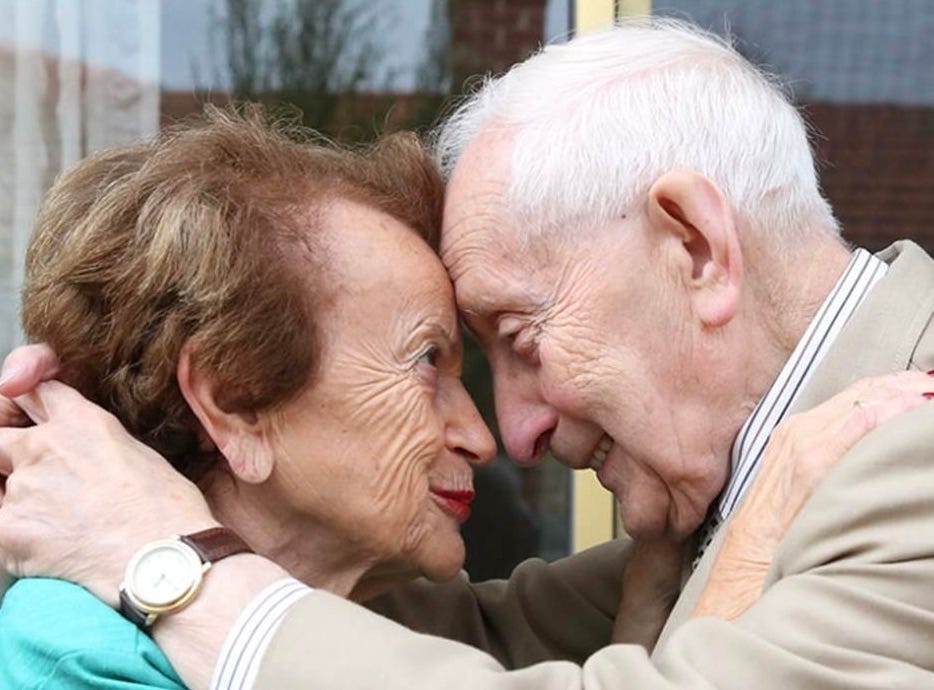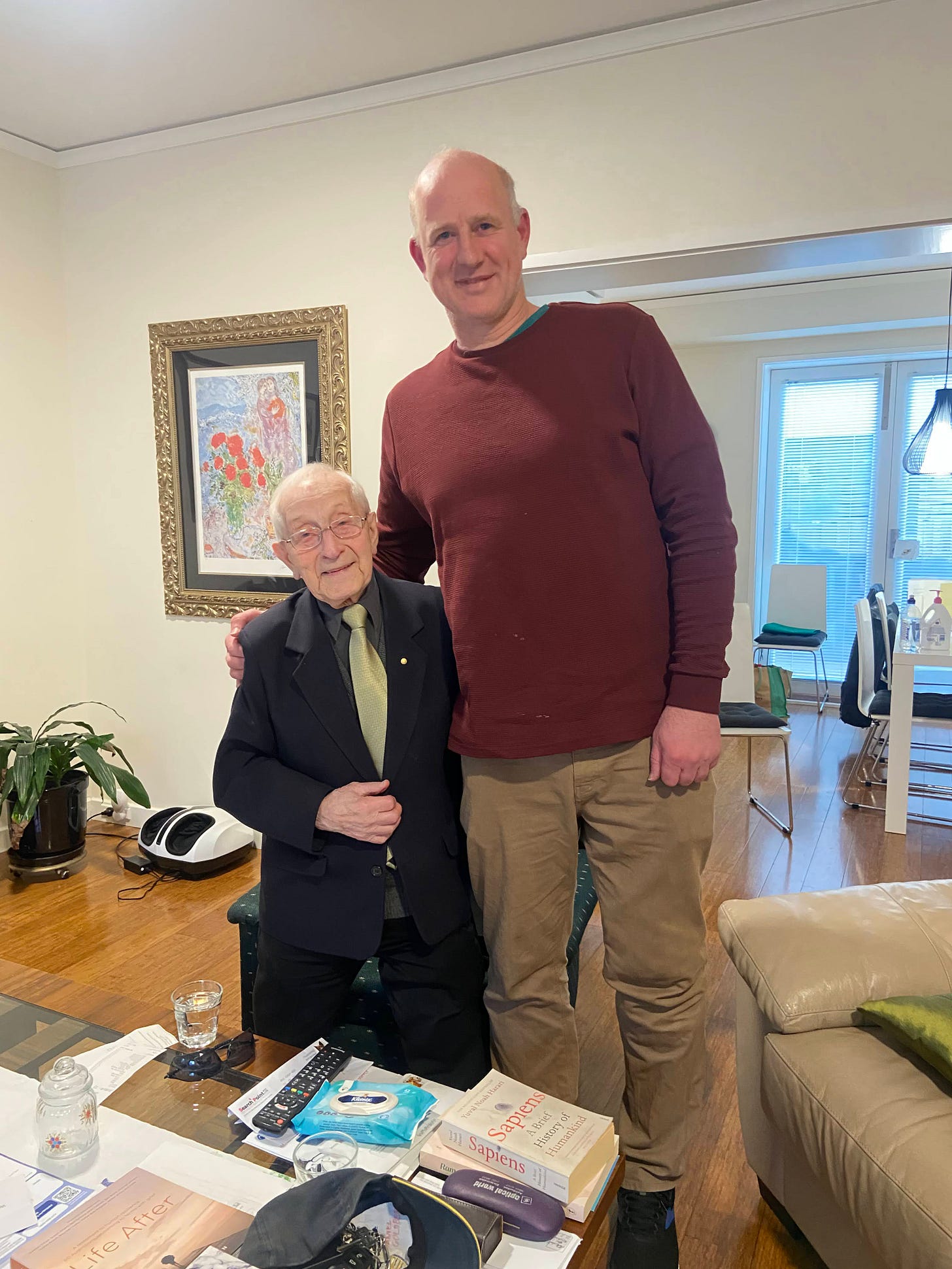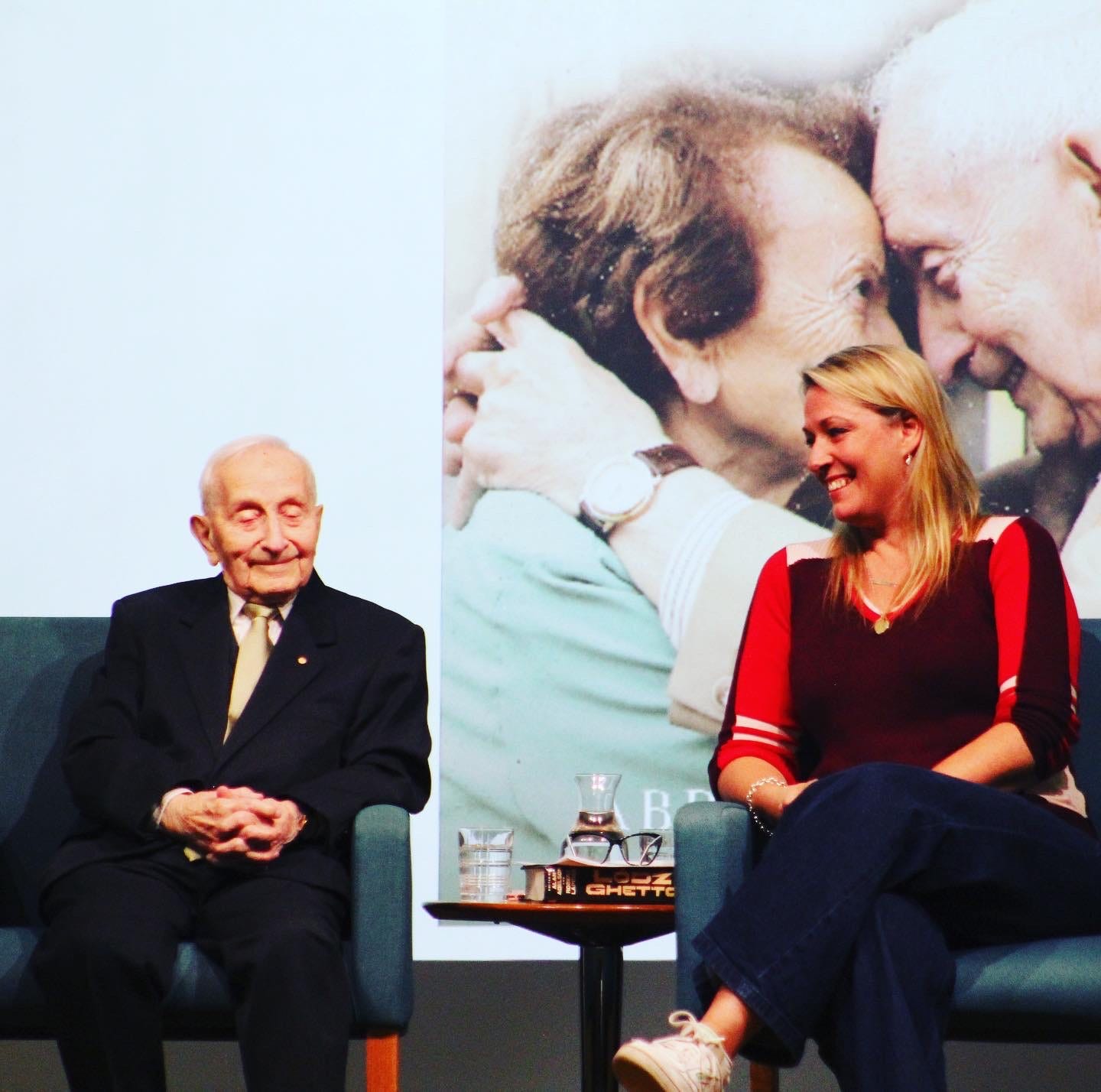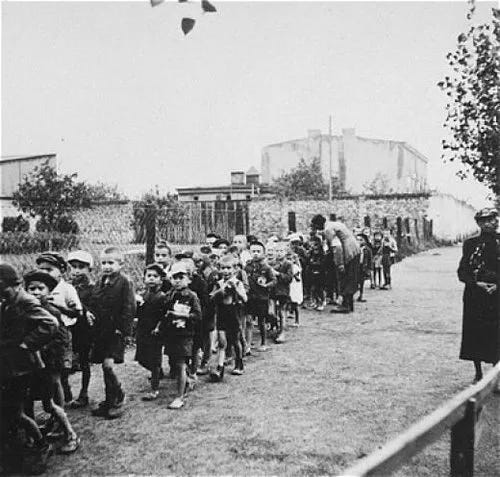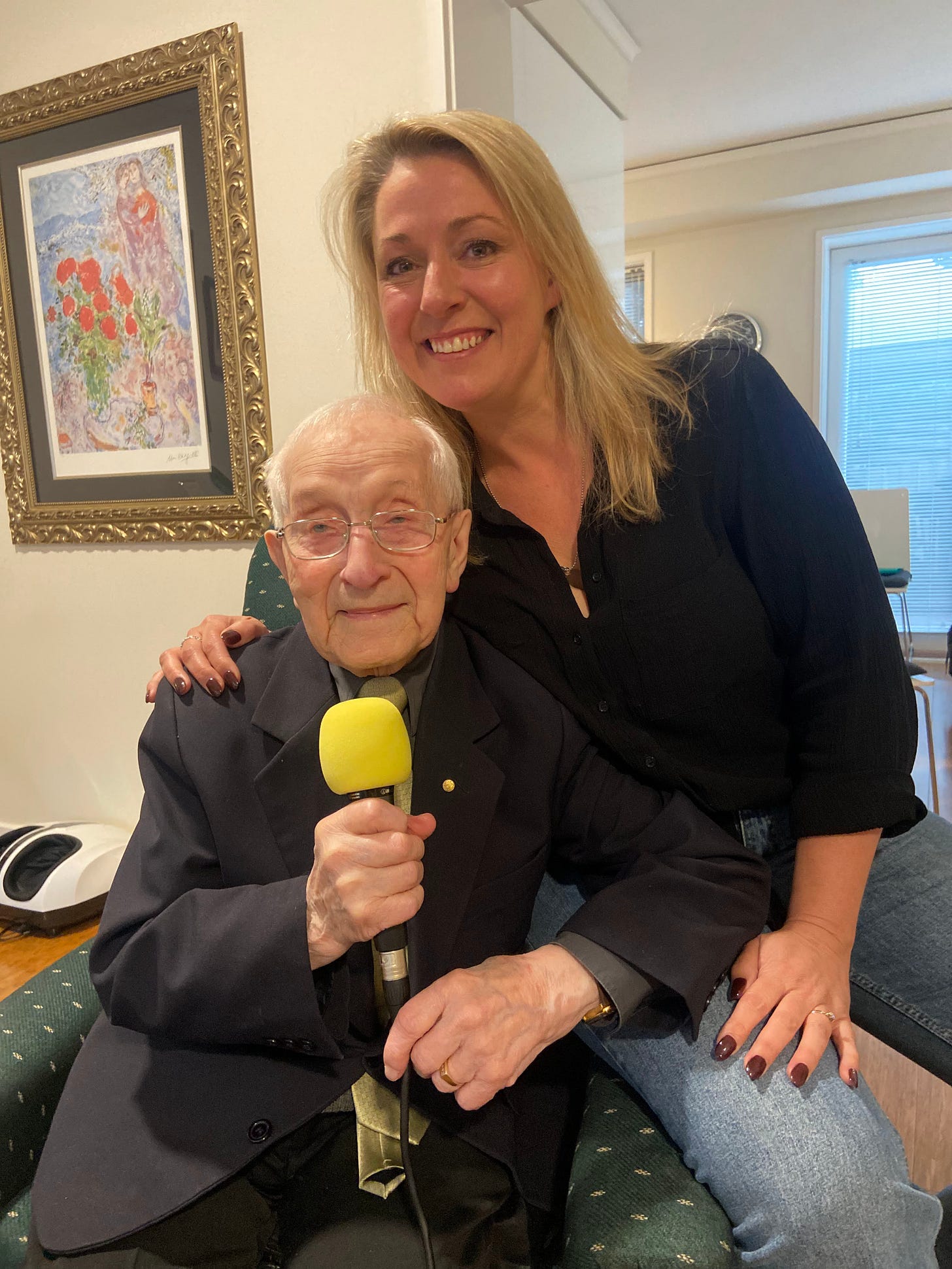The man who lived — RIP Abram Goldberg 1924-2025
The oldest man to appear on the Speakola podcast has died, aged 100. Abram Goldberg survived the Holocaust and made living his mission. He was a beautiful person. RIP.
Only two months ago my friend Laini (a Speakola subscriber) suggested taking my kids through Melbourne’s Holocaust Museum with Abram Goldberg. ‘He doesn’t do as many tours, but I think he still does them’.
It says everything about Abram that he told his story to the end. I met him first at the Holocaust Museum in the early 90s, when I was studying Jewish History and the Holocaust with Mark Baker at Melbourne University. Mark is another brilliant speaker, now departed from pancreatic cancer, who has several amazing speeches on Speakola.
But Abram was something else. Tiny in stature, he exuded charisma and humour, and so much vitality, even as he approached his centenary. I read a Penguin book of speeches at the time of setting up Speakola, and the most disturbing one in the collection was Chaim Rumkowski’s ‘Give me Your Children’. Rumkowski was the Nazi appointed Jewish leader of the ghetto, and the price he paid for the small privileges of his position was that he passed on Nazi decrees and, in an administrative sense, smoothed the way for mass murder. The speech is so upsetting, it involves Rumkowski asking parents to hand over their children to the Nazis, so the ghetto can avoid liquidation. I found out at some stage that Abram Goldberg was there in the Lodz square to hear it, and so made inquiries though my friend Fiona Harris (who assisted with Abram’s recent memoir) to interview him.
There was a comic element to our height differential. Abram told me that he was ‘considerably taller’ in the Lodz ghetto in 1942, ‘but still never as tall as you’. Shrinking, he told me, was one of the downsides of being nearly one hundred.
But he never shrank as a person, and he more than fulfilled his promise to his mother on the train station at Auschwitz. That if he lived, he would never stop telling the story, never stop being the voice for all those who went silent.
This is the transcript of the part of the episode:
You see, I’m a survivor of the Holocaust. I was the youngest of four siblings. Of my entire family, I, and my older sister, who was seven years older than me, were the sole survivors of my entire family, around nearly fifty.
And in 1944, when the ghetto in Łódź was liquidated, I was with my mother. After hiding for over four weeks in August 1944, when I was hiding in an attic with my mother, well we had to go up to the attic, it was concealed, and there was no ladder, so we made our ladder out of rope. And my mother had to walk up when we needed to, and in the evenings we come down. But after four weeks, she was fifty three years of age, she was emaciated, physically very weak. I wasn’t, but my mother, she was fifty three years of age, and she realised she can’t do it any longer.
And she thinks she is a burden to me, that she is preventing me from hiding. And so she came out with a proposition that I should go on hiding, and she will present herself for deportation. Well then in 1944, I was eighteen years of age, so, well, I couldn’t let my mother go on her own.
I knew where we were going to be taken. That we are going to Auschwitz, Oświęcim, in Polish, and I knew that it was a place of death. I didn’t know exactly how it’s done there, how they’re murdering the Jews there, but I knew it was a place of extermination.
So well, I will take my chance, I didn’t tell my mother that I’m going to take a chance, I told my mother, ‘I’ll go with you’. My mother insisted that I stay, but she couldn’t persuade me to stay.
I was sure that I would be able to help her, like I’d been able to help her for the last four years incarcerated in the ghetto.
So we went. Of course, it was a voyage, a voyage in cattle trucks, squeezed in, the conditions that were indescribable. When we arrived on the 29th of August 1944, and of course when they opened the heavy doors of the cattle train, the scream of the SS and the barking dogs, my mother realised then, when we were driven out of the cattle train, I had to help her down from the train, and when we stood together, and when they started to scream, ‘Men one side, women and children the other side!’, my mother realised immediately, she was fifty three years of age, that she’s not going to survive.
So she turned to me, and in those instants that we were still together, she said, ‘Abram, you should do everything humanly possible to survive. And when you will survive, wherever you will find yourself, you should tell people what actually happened. And then we were parted, never to be seen again.
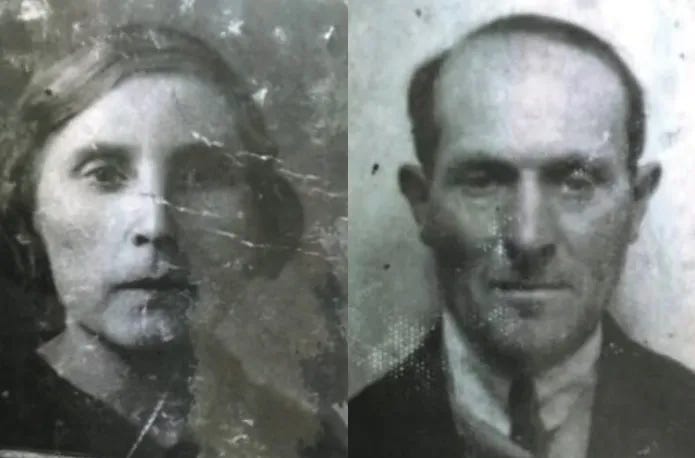
Abram also gave that first hand account of the Rumkowki speech, the ‘Give Me Your Children’:
Chaos ensued. People began to flee from the square, running home in desperation and panic, to hide their children and their elderly relatives. Walking home, Dad and I passed distressed parents dragging their crying children down the street, searching for somewhere to hide them and keep them safe for the next seven days.
As Dad and I walked, we talked about what we would do. We knew we would both be safe as we were considered essential workers, but my aunt, Mum’s sister, had six children, all aged between four and ten — the ages of children that were to be taken away.
We needed to keep Mum out of sight too. Both Mum and her sister looked older than they were. Mum was only fifty-one, but ghetto life and starvation had taken a toll on her, and she was weak, frail and had grey hair. The Germans would almost certainly take her for deportation, and we were not willing to take that risk.
‘When the Nazis get near to our area,’ Dad said, his expression calm, but his voice trembling. ‘I will hide your cousins and aunt, and you must hide your mother, okay?’
Abram wrote a memoir (with Fiona Harris) called The Strength of Hope,. Like a savvy author, he kept saying to me during our chat ‘you’ll have to read the book to find out more about that’. It’s a great book, and I’m glad Fiona kept chipping in and saying, ‘come on Abram, tell them, in case they don’t read the book.’
That said, the book is amazing, and so is this episode of the podcast. Fiona joined Abram, to help prompt him towards stories, and he unflinchingly relayed the horror, as he did for over seventy years.
When he died on September 21st, Fiona Harris posted on facebook a speech she delivered on the day of his death at a celebration of life at the Melbourne Holocaust Museum. It’s a beautiful speech, and I’ll ask Fiona to add it to Speakola’s eulogies collection.
When I first met Abram, it was all about the words. Talking to him, listening as he spoke about his extraordinary life experiences, writing it all down and sharing those words with the world in our book, The Strength of Hope. But our relationship quickly moved from words to something much more. It became about friendship, family, connection, hugs, handholding, laughter, food, vodka, music and love. With Abram, it was always about the love. Every parting ended with an emphatic, “I love you”, and “Send my regards to the family” and then another “I love you” for good measure.
It feels impossible that he’s gone. That we now live in a world without Abram Goldberg. He seemed almost indestructible, and indeed, over these past few weeks, we all saw that incredible and almost superhuman strength and will to survive that has always been such a huge part of who he was. Those of us who sat with him in the hospital, holding his hand or kissing his head felt incredibly lucky to have the chance to say our goodbyes, to tell him how much we loved him—and to hear him say that he loved us, which he did over and over, every time he opened his eyes. Like I said, it was all about love.
And I loved him so much.
Abram was only in my life for five years—barely a blip in his extraordinarily long one. I’m not as lucky as the rest of you here tonight who knew him for so much longer, but the impact Abram had on me and my family in these few short years has been profound. He changed all of us and the way we see the world, and made us feel more grateful for the lives we have. He taught us that kindness, hope, and standing up for each other are the things that truly matter.
When my publisher first asked if I’d consider writing Abram’s memoir, I said that of course I’d be honoured, but “does he know I’m not Jewish?” I was worried I wasn’t the right fit, and that I couldn’t possibly do justice to the story of a man who had survived and lost so much, who had endured the kind of pain and suffering I couldn’t even begin to imagine. But I was quickly reassured. Abram didn’t care about race or religion. He just wanted someone who could tell his story with truth, respect and heart, and from that first Zoom call, I felt the warmth and kindness of Abram, Helen, and Charlie through the screen.
Soon after that meeting, Abram, Charlie and I began our weekly get-togethers. We’d sit at Abram’s kitchen table for a couple of hours, where I’d ask Abram questions, recording his responses on my phone so that I could capture his authentic voice and personality while writing the book. Each week I’d write new questions, breaking them up into the different stages of his life, and slowly worked my way through his experiences and stories over ninety-seven years. It got harder when I needed to dig into Abe’s feelings and emotions because as everyone here knows, he was a facts and figures kind of guy. Luckily we found some vodka to help us through those sessions.
Slowly but surely, the working relationship turned into a personal one, and one that included not just me, but my whole family, and not just Abram, but the entire Goldberg family. We love you all and cherish the many wonderful social gatherings we’ve enjoyed together over the past five years, full of laughter, good food, great conversation, music, singing, dancing...and Abram secretly feeding the dogs under the table!
Abram was funny, passionate, a bit naughty and never at a loss for words. He cherished his role here at the Holocaust Museum where he spoke to students every week, as he’s done for some many years, doing his enormous part in trying to make this world a better place. He had an unwavering belief that love, tolerance, and hope are our greatest strengths, and that we all belong to one race: the human race.
Above all else, Abram loved the people around him - his beautiful Cesia, his amazing close-knit family, his community and his many friends. And now, he’s with his beloved Cesia again. The loss of her earlier this year was immeasurable, as you all know, and it gives me great comfort to think that they are together again. I like to imagine them sitting side by side on the couch, Abram’s arm around Cesia, occasionally reaching out to stroke her cheek, as I saw him do so many times.
To know Abram was to love him. And to love him was a gift and an honour that I’ll carry with me forever. And I’ll keep sharing his message of hope, tolerance and acceptance, because the world needs it now more than ever.
Rest in peace my beautiful friend. xxx



